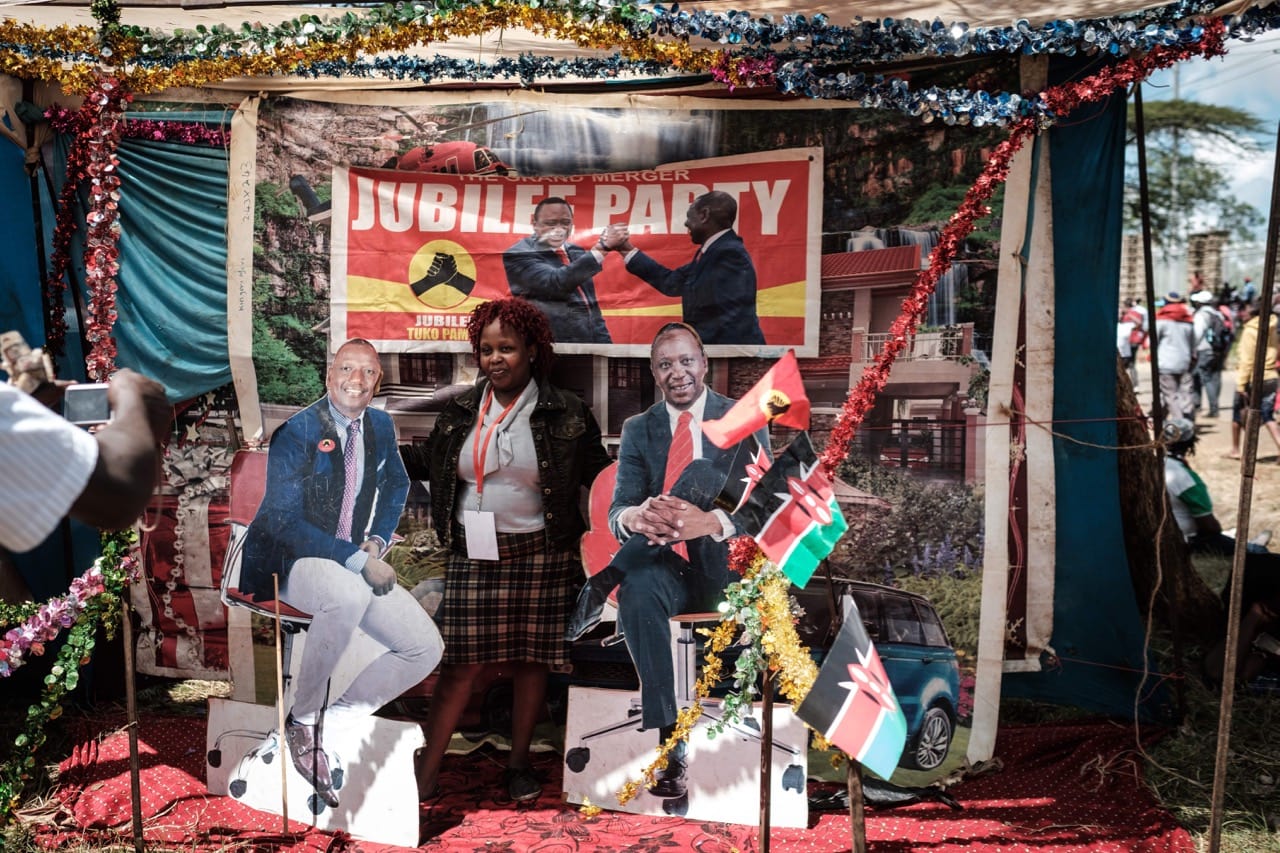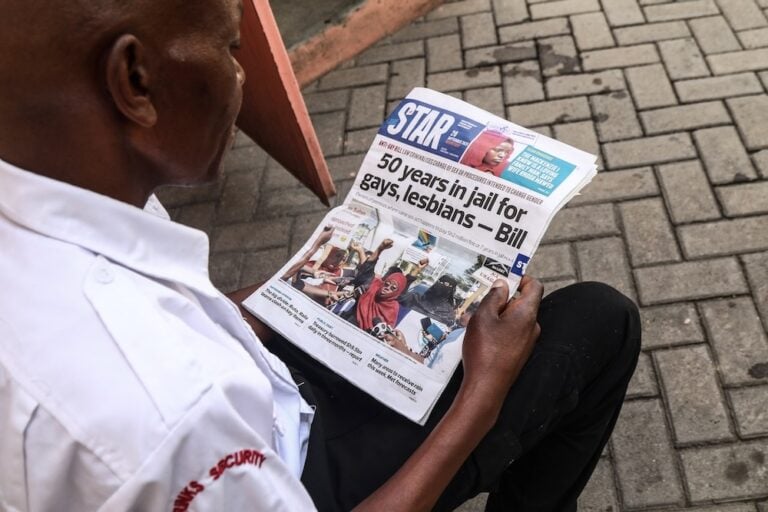A new investigation reveals the role of an American data-based digital advertising company in the highly divisive online re-election campaign of Kenyan president Uhuru Kenyatta.
This statement was originally published on privacyinternational.org on 13 December 2017.
The battle for Kenyan voters’ allegiance in the 2017 Presidential election was fought on social media and the blogosphere. Paid advertisements for two mysterious, anonymous sites in particular started to dominate Google searches for dozens of election-related terms in the months leading up to the vote. All linked back to either “The Real Raila”, a virulent attack campaign against presidential hopeful Raila Odinga, or Uhuru for Us, a site showcasing President Uhuru Kenyatta’s accomplishments. As ads for the two sites flooded Twitter, Facebook and YouTube accounts across the country, Kenyans speculated that British data analytics firm Cambridge Analytica had fronted them. The company has previously been reported to be working for the President. It was clear that whoever sponsored them had a lot of money to spend.
The two online campaigns were actually created by Harris Media LLC, a far-right American digital media company, on behalf of President Kenyatta’s re-election campaign, Privacy International can reveal. Harris Media are a digital advertising and creative agency for primarily political clients. Harris Media uses data analytics to create political campaigns that target audiences using information gleaned from how people use their social media accounts. Its previous clients include the Trump campaign and several far-right European parties.
Harris Media’s Real Raila and Uhuru for Us campaigns relied on ad words in Google search and apparently targeted advertising on a range of social media platforms. This raises serious concerns about the role and responsibility of companies working for political campaigns in Kenya’s volatile political climate, particularly considering The Real Raila’s incendiary claims include that rival opposition candidate Raila Odinga’s administration would “remove whole tribes”, for example. It also highlights the risks inherent to voter profiling and micro-targeting in a country with no data protection laws.
A data-driven dirty campaign
The way in which data is used in elections and political campaigns is highly privacy invasive, raises important security questions, and has the potential to undermine faith in the democratic process. However, data-driven campaigning is nothing new. For decades, campaigns have been using and refining targeting, looking at past voting histories, demographic and other information to understand voters’ issues and values, mirroring tactics long used by marketers and commercial advertisers.
What is new, however, is the granularity of data that is available to campaigns. Data brokers and data analysis companies collect or obtain data about you, for example, your browsing history, your location data, who your friends are, or how frequently you charge your battery, and then use these data to infer additional, unknown information about you, like your next purchase, your gender, your personality, your preferred candidate, your emotional state, your sexual orientation, etc. This is then used to create a profile of you. The profile is used to selectively target custom audiences with shiny, sometimes bespoke political ads.
This is a major part of Harris Media’s business model. “Facebook ads allow you to identify and target people who are in 100% agreement with your values system”, founder Vincent Harris in a post from 2010 about targeted advertising, discussing recent work. “[Facebook’s] functionality, and organic user base make its usage far more beneficial than spending time and money having to cultivate support on a unique platform.” Geo-tagging, re-tagging, behavioural targeting, demographic targeting, voter file targeting, individual targeting by email address and cookie targeting: all are strategies Harris promoted in a 2014 reflection on digital campaigns.
Another tactic is the judicious use of Google Adwords. This explains why paid-for ads for The Real Raila and Uhuru For Us emerged above the search results for many Kenyan election-related search terms. As of 2015, an advertiser could use personal information held by them, such as email addresses, to target customers using Google’s ad service. Facebook, Twitter, and Google do not just facilitate ‘better’ targeting. They also actively shape campaign communication through their close collaboration with political staffers, according to one academic study. The recent scandal over alleged Russian government interference in the 2016 US presidential race on social media has prompted calls for the regulation of micro-targeting practices.
In a campaign for the far-right Alternative for Germany party, Harris Media reportedly created target groups for anti-immigrant messages including mothers, business owners and working-class people using the “lookalike audience” feature of Facebook. How it works: an advertiser creates a pre-identified “custom audience” of individuals that the advertiser wants to target with its messages using data in its possession, like customer and prospect lists, people who have visited the advertiser’s website or app, or people who have interacted with its Facebook Page or adverts. By analysing shared interests and demographic details of this “custom audience”, Facebook generates a new list of Facebook users for the advertiser who share the custom audience’s attributes – the lookalike audience.
How was targeting done for Harris Media’s Kenyan campaigns, and using what data? Did some of these groups include tribal affiliation or other politically sensitive criteria? The fact that we cannot (currently) answer these questions – and that we do not know if and how these specific ads were targeted – raises serious concerns about accountability and transparency. It leaves unanswered important questions as to how such data will be stored, who will have access to it, and what it will be used for.
Harris’ campaigns for the President landed at a time Kenya was experiencing widespread media suppression and intimidation, the brutal murder of a key electoral official, and tit-for-tat accusations of hate speech by Kenyatta’s team and Odinga himself. By July, the country’s National Integration and Cohesion Commission and electoral observers warned of “a serious risk of violence”. And with reason. At least 33 people were killed in Nairobi alone following the August 8 election, most of them as a result of action by the police, according to Human Rights Watch.
Harris Media publicly claims much of its political campaign work – even for controversial international clients like the extreme right AfD (Germany) and the Front National (France), and Israel’s Likud government. Kenya, however, was not one they were eager to claim. Yet the digital trail from both of the Kenyan digital campaigns leads firmly back to the Austin, Texas outfit.
The Real Raila and another site which links back to Uhuru for Us, Candidates for Kenya, share an IP address with Harris Media’s own website and over 30 conservative campaigns. These include the websites for the Republican Party of Texas, pro-fracking and oil industry lobbies, and a Benghazi attack conspiracy theory site, among others. The Real Raila’s Google Analytics tag (UA-46042337), is shared with several known Harris Media campaigns. A tag is a piece of data-collecting code assigned to a website by its creator to collect visitor behaviour information. The Uhuru for Us site (UA-51987218) also shares its tag with 39 other conservative websites, several of which are publicly attributed to Harris Media.
Three Harris Media staff, including Josh Canter, its vice president for content production, an account director, and a designer worked on The Real Raila site, authoring blog content, mostly republishing lightly-sourced characterisations of Odinga as a dangerous, racist xenophobe with promoting his tribe and family as his primary political aim. The Uhuru For Us Twitter account still appears linked to a Harris Media email address. Created in March 2017, its first follower was Kenyatta’s Digital Media Strategist.
Harris Media did not respond to requests for comment on the company’s work in Kenya. Senior Harris Media staff have informally publicly discussed work for President Kenyatta, according to two independent sources. Secretary-General of the President’s Jubilee Party, Raphael Tuju, claims no knowledge of the Real Raila site.



